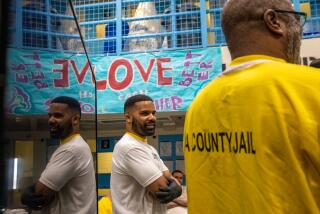Op-Ed: Plead guilty, go home. Plead not guilty, stay in jail
One night in their apartment, Arthur and his boyfriend had a fight. The police came and spoke first to the boyfriend, who claimed Arthur had battered him. They arrested Arthur, who told them that he had been attacked and had defended himself. In the courthouse lockup two days later, he told his appointed lawyer the same thing. His lawyer agreed that they should take the case to trial.
Arthur pleaded not guilty to the misdemeanor charge and asked the judge to release him while awaiting the trial that would decide who was telling the truth. His lawyer explained that Arthur had no criminal record, was working two jobs, and had another place to stay so the fight would not be repeated. But the prosecutor argued that Arthur was too dangerous to be released, and the judge took the prosecutor’s side, setting a bail that Arthur could not possibly pay.
Arthur (whose name I have changed to protect his privacy) would have to stay in jail for 30 more days before trial. He would lose his jobs and he feared exposure to violence, so he asked his lawyer if there was anything he could do to get out. His lawyer spoke to the prosecutor, who made him an offer — plead guilty now and get three years of probation, pay fines, attend classes and do community labor. Get out of jail right away, in other words, but accept a criminal record.
Pretrial detention leads to more and quicker convictions, but it also leads to innocent people pleading guilty.
So he changed his plea and took the deal. The prosecutor agreed to the immediate release of a man who had supposedly been too dangerous to set free just a few minutes earlier.
Arthur’s case is not unusual; in California, it’s perfectly routine. Hundreds of times a day, people accused of crimes plead guilty, not because they don’t want a trial, but because the judge sets a bail they cannot pay, and they cannot risk the harm to their lives caused by spending days, weeks, even months in pretrial detention.
Human Rights Watch recently studied the California bail system and found that, in the six counties whose data we examined closely, 70% to 90% of all misdemeanor or non-serious felony defendants plead guilty and were released before their first possible trial date. This suggests that California is coercing people into giving up their right to contest their cases by giving them an ugly choice—if you assert your innocence, you stay in jail; if you plead guilty, you go home.
We spoke to defendants, lawyers and court officials who acknowledged the coercive effect of custody. As a deputy public defender and private criminal defense lawyer for over 20 years, I saw it constantly.
Prosecutors know that defendants in custody will plead guilty more quickly than those who are out. So they request bail and enjoy the leverage custody gives them. Judges, feeling pressure to move their calendars rapidly, set bail recognizing that defendants in jail resolve their cases more easily.
California Chief Justice Tani Cantil-Sakauye, a former prosecutor herself, said: “I’ve seen it. A time-served offer on a custody defendant on a low-level charge, all they think about is, ‘Do I get out today? Can I get out today?’”
Pretrial detention leads to more and quicker convictions, but it also leads to innocent people pleading guilty. It is unfair and undermines respect for the courts.
Our justice system should not be about coercing guilty pleas and processing tainted convictions as quickly as possible. It should not provide one quality of justice for people with enough money to pay for pretrial freedom and a lesser quality of justice for those without wealth.
Arthur’s guilty plea will bring him a lifetime of negative consequences. Even after he completes his probation, attends his classes and pays his fees, he will have a criminal record. That record will limit his employment, education and housing opportunities. And we will never know if he did in fact commit any crime. All we know is that he couldn’t afford the steep personal and financial cost of going to trial.
Instead of using the bail system to keep the truly dangerous few in custody until their cases are decided, we use it to coerce guilty pleas. The result is that justice in our courts depends on wealth.
John Raphling is a senior U.S. criminal justice researcher at Human Rights Watch.
Follow the Opinion section on Twitter @latimesopinion or Facebook
More to Read
A cure for the common opinion
Get thought-provoking perspectives with our weekly newsletter.
You may occasionally receive promotional content from the Los Angeles Times.










